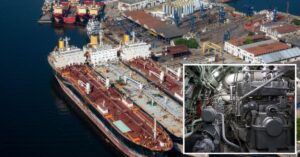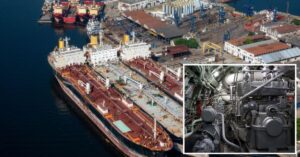Kawasaki Heavy Industries Admits To Altering NOx Test Results, Exposing Japan’s Marine Engine Scandal

International Maritime Organization Grants Consultative Status To Methanol Institute
August 22, 2024
U.S. Navy Deploys 2nd Aircraft Carrier In The Middle East Amid Escalating Regional Tensions
August 22, 2024

Kawasaki Heavy Industries (KHI) has become the third major Japanese Engine manufacturer to admit to falsifying test results for marine engines, further intensifying the scandal that has shaken Japan’s maritime sector.
Since January 1, 2000, the company has altered test results for 673 of its two-stroke diesel engines to meet required specifications. The alteration adjusted shop trial fuel consumption rates to be under legal limits that could impact NOx emissions calculations.
However, KHI stated that the engines’ safety was not compromised. This disclosure follows similar confessions from other prominent Japanese manufacturers.
In February 2024, a whistleblower revealed that IHI Power Systems had been falsifying fuel consumption data for decades. This led to an internal report that revealed over half of the engines shipped did not meet required specifications.
IHI found that 58 models of marine engines and 40 models of land-use engines were involved, with approximately 4,900 marine engines, 86% of the total affected.
Hitachi Zosen later revealed in July 2024 that it had been altering test data involving more than 1,300 engines used globally since 1999.
Following the disclosure of these issues, the Japanese Ministry of Land, Infrastructure, Transport, and Tourism (MLIT) requested KHI to conduct a fact-finding investigation. Kawasaki confessed the misconduct on July 12, 2024, after receiving the ministry’s request on July 05, 2024.
While most alterations involved two-stroke engines, only one case involved a four-stroke engine built mainly for international shipowners.
In its investigation, Kawasaki revealed that the data manipulation occurred during shop trials, which included NOx emission verification testing.
The company admitted the seriousness of the misconduct and promised to prevent such incidents in the future.
KHI plans to form a special third-party investigative committee to determine the root causes and implement corrective measures.
KHI, known for having the world’s largest two-stroke diesel engine program, reiterated its commitment to complying with the International Maritime Organization’s (IMO) NOx emission requirements. The firm has been a leader in fuel efficiency and economy with its widely used diesel engines, particularly in bulk and car carriers.
The issue has negatively impacted Japan’s reputation in the maritime sector, raising concerns about regulatory monitoring and the reliability of emissions data from major engine manufacturers.
Reference: InfoMarine, Crew Mirror
Kawasaki Heavy Industries Admits To Altering NOx Test Results, Exposing Japan’s Marine Engine Scandal appeared first on Marine Insight – The Maritime Industry Guide
Source: Maritime Shipping News


